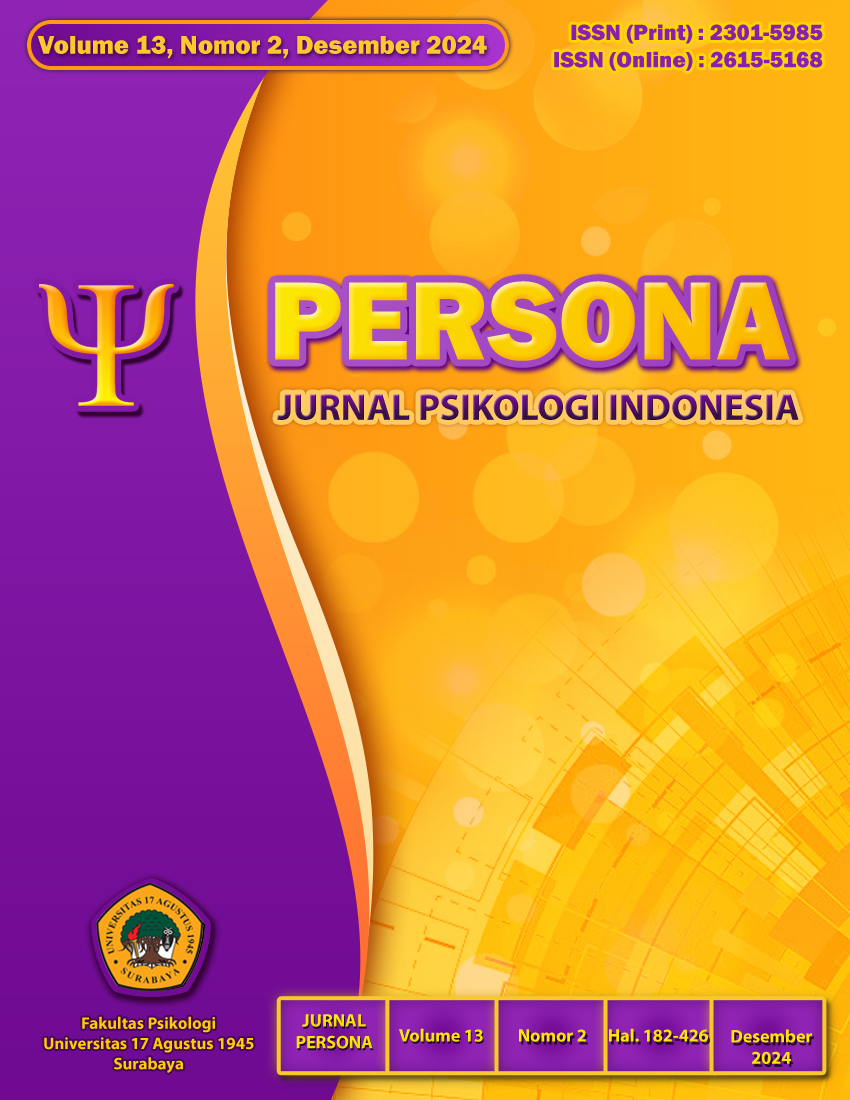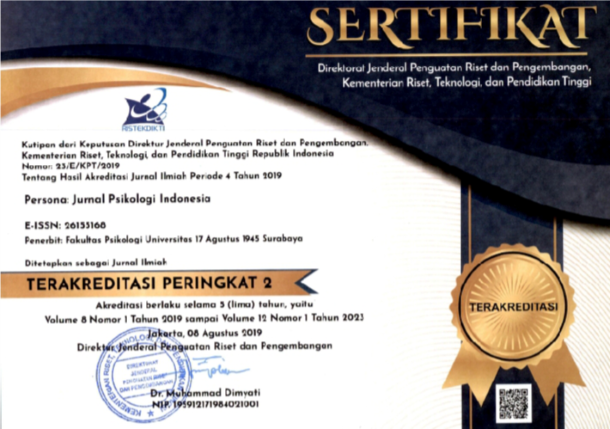Dukungan keluarga dan konflik pekerjaan-keluarga pada ibu bekerja: Menguji peran relasi sosial sebagai mediator
Family support and work-family conflict in working mothers: Testing the role of social relations as a mediator
Abstract
The research aims to determine the effect of family support on work-family conflict in working mothers through social relations of equity matching and communal sharing. The research uses an indigenous psychology approach. The research was conducted in the Special Region of Yogyakarta, the characteristics of the research subjects were wives who identified themselves as ethnic Javanese, had children under 12 years old who lived with the subjects and worked as professionals. Research data collection used the work-family conflict scale, husband's support scale, family support scale, communal sharing social relations scale, equity matching social relations scale given to 296 research subjects. Analysis of the research data used was to test the measurement model simultaneously on 4 constructs using path analysis. Based on the model test results, it was found that the family support model in Javanese family social relations for working mothers who experience work-family conflict has been empirically tested. The implication of the research results obtained in the form of a model of family support in family social relations for working mothers who experience work-family conflict is a truly pure understanding of Indonesian people so that this model can be applied according to the Indonesian cultural context.Downloads
References
Aisyah, N. (2013). Relasi gender dalam institusi keluarga (pandangan teori sosial dan feminis). Muwazah, 5(2), 203–224. https://doi.org/10.28918/muwazah.v5i2.346
Allen, T. D., Regina, J., Wiernik, B. M., & Waiwood, A. M. (2022). Toward a Better understanding of the causal effects of role demands on work–family conflict: a genetic modeling approach. Journal of Applied Psychology, 108(3). https://doi.org/10.1037/apl0001032
Amah, O. E. (2021). Managing the negative effects of work-to-family and family-to-work conflicts on family satisfaction of working mothers’ in Nigeria: the role of extended family support. Community, Work and Family, 24(3). https://doi.org/10.1080/13668803.2019.1697646
Aycan, Z., & Eskin, M. (2005). Relative contributions of childcare, spousal support, and organizational support in reducing work-family conflict for men and women: The case of Turkey. Sex Roles, 53(7–8), 453–471. https://doi.org/10.1007/s11199-005-7134-8
Badan Pusat Statistik. (2022). Indikator pasar tenaga kerja Indonesia Agustus 2022 (Direktorat Statistik Kependudukan dan Ketenagakerjaan, Ed.). Badan Pusat Statistik.
Beham, B., Ollier-Malaterre, A., Allen, T. D., Baierl, A., Alexandrova, M., Artiawati, Beauregard, T. A., Carvalho, V. S., Chambel, M. J., Cho, E., da Silva, B. C., Dawkins, S., Escribano, P. I., Gudeta, K. H., Huang, T. pang, Jaga, A., Kost, D., Kurowska, A., Leon, E., … Waismel-Manor, R. (2023). Humane orientation, work–family conflict, and positive spillover across cultures. Journal of Applied Psychology, 108(10), 1573–1597. https://doi.org/10.1037/apl0001093
Cronshaw, S., Stokes, P., & McCulloch, A. (2023). Outside looking in: Gendered roles and the wellbeing of working student mothers studying for a part-time PhD. Higher Education Quarterly. https://doi.org/10.1111/hequ.12471
Eckart, E. C., & Ziomek-Daigle, J. (2019). An investigation of the variables that influence female counselors’ work–family conflict. Journal of Employment Counseling, 56(2). https://doi.org/10.1002/joec.12112
Fiske, A. P. (2012). Metarelational models: Configurations of social relationships. European Journal of Social Psychology, 42(1), 2–18. https://doi.org/10.1002/ejsp.847
Ford, M. T., Heinen, B. A., & Langkamer, K. L. (2007). Work and family satisfaction and conflict: A meta-analysis of cross-domain relations. Journal of Applied Psychology, 92(1), 57–80. https://doi.org/10.1037/0021-9010.92.1.57
Febriani, W. Y., Kurniawan, H., Fitriany, R., & Khairiyah, U. (2024). Hubungan antara work-familly conflict dengan fear of success pada guru SMK Negeri X kota Padang. Jurnal Pendidikan Sosial Dan Konseling, 2(1), 176-181.
French, K. A., Dumani, S., Allen, T. D., & Shockley, K. M. (2018). A meta-analysis of work-family conflict and social support. Psychological Bulletin, 144(3), 284–314. https://doi.org/10.1037/bul0000120
Galardo, L., & Trottier, M. (2022). How supervisor, co-worker, and spousal social support influences the experience of workload and work-family conflict: results from a survey of construction workers in Québec. Construction Management and Economics, 40(4). https://doi.org/10.1080/01446193.2022.2037674
Galizzi, G., McBride, K., & Siboni, B. (2024). Patriarchy persists: Experiences of barriers to women’s career progression in Italian accounting academia. Critical Perspectives on Accounting, 99. https://doi.org/10.1016/j.cpa.2023.102625
Gauci, P., Elmir, R., O’reilly, K., & Peters, K. (2022). Women’s experiences of workplace gender discrimination in nursing: An integrative review. In Collegian (Vol. 29, Issue 2). https://doi.org/10.1016/j.colegn.2021.08.003
Ginting‐Carlström, C. E. (2024). ‘Who is the ideal woman?’: The subjectification of impoverished Javanese working mothers. Gender, Work & Organization. https://doi.org/10.1111/gwao.13140
Gopalan, N., Pattusamy, M., & Gollakota, K. (2020). Role of support in work–family interface among university faculty in India. South Asian Journal of Business Studies, 9(3). https://doi.org/10.1108/SAJBS-11-2019-0211
Griggs, T. L., Casper, W. J., & Eby, L. T. (2013). Work, family and community support as predictors of work-family conflict: A study of low-income workers. Journal of Vocational Behavior, 82(1), 59–68. https://doi.org/10.1016/j.jvb.2012.11.006
Handayani, C. S., & Novianto, A. (2004). Kuasa Wanita Jawa. LKIS Pelangi Aksara Yogyakarta.
Hartini, S., Cempaka, R. R., Lufthiansyah, M. F., Sekali, O. K., Elvinawanty, R., & Simatupang, M. (2024). turnover intention ditinjau dari work family conflict pada karyawati/pegawai wanita Universitas Prima Indonesia. Jurnal Diversita, 10(1), 88-98.
Kelley, H. H., LeBaron-Black, A., Hill, E. J., & Meter, D. (2021). Perceived family and partner support and the work-family interface: a meta-analytic review. in revista de psicologia del trabajo y de las organizaciones (Vol. 37, Issue 3). https://doi.org/10.5093/jwop2021a15
Kementerian Pemberdayaan Perempuan dan Perlindungan Anak. (2019). Profil perempuan Indonesia. In Profil Perempuan Indonesia.
Kokot-Blamey, P. (2021). Mothering in accounting: Feminism, motherhood, and making partnership in accountancy in Germany and the UK. Accounting, Organizations and Society, 93. https://doi.org/10.1016/j.aos.2021.101255
Kossek, E. E., Pichler, S., Bodner, T., & Hammer, L. B. (2011). Workplace social support and work-family conflict: A meta-analysis clarifying the influence of general and work-family-specific supervisor and organizational support. Personnel Psychology, 64(2), 289–313. https://doi.org/10.1111/j.1744-6570.2011.01211.x
Lakshminarayanan, S., & Savarimuthu, A. (2013). Work-family conflict- an exploratory study of the dependents child’s age on working mothers. Rev. Integr. Bus. Econ. Res, 2(1), 449–470. https://ssrn.com/abstract=4148724
Molina, J. A. (2021). The Work–family conflict: evidence from the recent decade and lines of future research. In Journal of Family and Economic Issues (Vol. 42). https://doi.org/10.1007/s10834-020-09700-0
Mordi, T., Adisa, T. A., Adekoya, O. D., Sani, K. F., Mordi, C., & Akhtar, M. N. (2023). A comparative study of the work–life balance experiences and coping mechanisms of Nigerian and British single student-working mothers. Career Development International, 28(2). https://doi.org/10.1108/CDI-10-2022-0280
Nofianti, L. (2016). Perempuan di sektor publik. Marwah: Jurnal Perempuan, Agama Dan Jender, 15(1). https://doi.org/10.24014/marwah.v15i1.2635
Noor, T., Mohamad, M., & Dahri, S. (2019). Relationship between social support and work-family conflict: A case study of women employees in a Malaysian higher education institution. Journal of Technical Education and Training, 11(2). https://doi.org/10.30880/jtet.2019.11.02.009
Nugraha, P., & Kustanti, E. R. (2020). Hubungan antara dukungan sosial suami dengan konflik peran ganda pada perawat wanita. Jurnal Empati, 7(2), 794-801.
Pocock, B., Williams, P., & Skinner, N. (2012). Conceptualizing work, family and community: a socio-ecological systems model, taking account of power, time, space and life stage. British Journal of Industrial Relations, 50(3), 391–411. https://doi.org/10.1111/j.1467-8543.2011.00852.x
Rahmawaty, A. (2015). Harmoni dalam keluarga perempuan karir: upaya mewujudkan kesetaraan dan keadilan gender dalam keluarga. Palastren, 8(1). https://doi.org/10.21043/palastren.v8i1.932
Rahmayati, T. E. (2020). Konflik peran ganda pada wanita karier. Juripol (Jurnal Institusi Politeknik Ganesha Medan), 3(1), 152–165. https://doi.org/10.33395/juripol.v3i1.10920
Ruderman, M. N., Ohlott, P. J., Panzer, K., & King, S. N. (2002). Benefits of multiple roles for managerial women. Academy of Management Journal, 45(2).
Sarwono, S. W. (2012). The indigenous psychology. Jurnal Psikologi Ulayat, 1(1), 1–16. https://doi.org/10.24854/jpu2
Soeharto, T. N. E. D., & Kuncoro, M. W. (2015). Konstruksi instrumen pengukuran dukungan suami dan konflik pekerja-keluarga pada ibu yang bekerja: Berbasis pendekatan indigenous. Prosiding Seminar Nasional Dan Temu Ilmiah Ikatan Psikologi Perkembangan Indonesia (IPPI) IX “Optimalisasi Peran Keluarga Untuk Meningkatkan Ketahanan Mental Menghadapi Tantangan Globalisasi.”
Soeharto, T. N. E. D., Kuncoro, M. W., & Prahara, S. A. (2020). Gambaran dukungan suami dalam relasi sosial suami dengan istri bekerja yang mengalami konflik pekerjaan-keluarga (dalam keluarga Jawa) : Pendekatan indigenous psychology. Insight: Jurnal Ilmiah Psikologi, 22(1), 53–60.
Susanto, N. H. (2015). Tantangan mewujudkan kesetaraan gender dalam budaya patriarki. Muwazah, 7(2), 120–130. https://doi.org/10.28918/muwazah.v7i2.517
Utami, K. P., & Wijaya, Y. D. (2018). Hubungan dukungan sosial pasangan dengan konflik pekerjaan-keluarga pada ibu bekerja. Jurnal Psikologi: Media Ilmiah Psikologi, 16(1).
Wang, H. M., Ma, A. L., & Guo, T. T. (2020). Gender concept, work pressure, and work–family conflict. American Journal of Men’s Health, 14(5). https://doi.org/10.1177/1557988320957522
Yulianto, J. E., & Faturochman. (2018). Interdependensi pada relasi perkawinan. In Psikologi Relasi Sosial (Issue October, pp. 120–138).
Zakharin, M., & Bates, T. C. (2023). Relational models theory: Validation and replication for four fundamental relationships. PLoS ONE, 18(6 JUNE). https://doi.org/10.1371/journal.pone.0287391
Zhang, R. P., & Bowen, P. (2021). Work-family conflict (WFC) – Examining a model of the work-family interface of construction professionals. Safety Science, 144. https://doi.org/10.1016/j.ssci.2021.105469
Zhou, S., Li, X., & Gao, B. (2020). Family/friends support, work-family conflict, organizational commitment, and turnover intention in young preschool teachers in China: A serial mediation model. Children and Youth Services Review, 113. https://doi.org/10.1016/j.childyouth.2020.104997
Copyright (c) 2025 Triana Noor Edwina Dewayani Soeharto, Muhammad Wahyu Kuncoro, Sowanya Ardi Prahara

This work is licensed under a Creative Commons Attribution-ShareAlike 4.0 International License.
The author who will publish the manuscript at Persona: Jurnal Psikologi Indonesia, agree to the following terms:
1. Authors retain copyright and grant the journal right of first publication with the work simultaneously licensed under a Creative Commons Attribution ShareAlike License that allows others to share the work with an acknowledgment of the work's authorship and initial publication in this journal.
2. Authors are able to enter into separate, additional contractual arrangements for the non-exclusive distribution of the journal's published version of the work (e.g., post it to an institutional repository or publish it in a book), with an acknowledgment of its initial publication in this journal.
3. Authors are permitted and encouraged to post their work online (e.g., in institutional repositories, pre-prints sites or on their website) prior to and during the submission process, as it can lead to productive exchanges, as well as earlier and greater dissemination of published work








